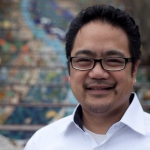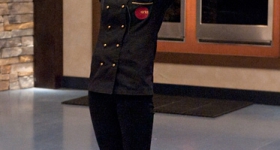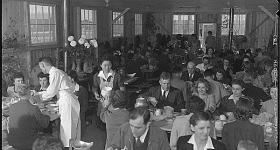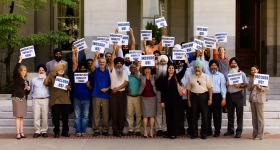Photo by Werth Media, cc, Flickr.
Over the past week, news headlines, talk shows and internet
traffic have been filled with commentary on the shooting death of 17-year-old Trayvon Martin. Martin was
shot by Florida neighborhood watch volunteer George Zimmerman. Zimmerman has
claimed self defense, but there is strong evidence from witnesses and a 911
recording that Martin was profiled and targeted because he looked
"suspicious": i.e., he wore a hoodie and was Black. Now reports are
investigating whether Zimmerman used a racial slur in that very
911 call.
Deservedly, the incident has sparked a great deal of outrage and media
responses. One piece that moved me was Michael Skolnik's powerful and, dare I
say, confessional response: "White People, You Will Never Look Suspicious Like
Trayvon Martin!"
"I was born white. It was the card I was dealt. No
choice in the matter. Just the card handed out by the dealer. I have lived my
whole life privileged. Privileged to be born without a glass ceiling.
Privileged to grow up in the richest country in the world. Privileged to never
look suspicious. I have no guilt for the color of my skin or the privilege that
I have. Remember, it was just the next card that came out of the deck. But, I
have choices. I got choices on how I play the hand I was dealt. I got a lot of
options. The ball is in my court."
But social privilege is not exclusive to white people in
America.
As Asian Americans, if we are going to stand in
solidarity with our African American brothers and sisters, we must not only
acknowledge our forms of privilege, but leverage the influence that comes with
that privilege in order to serve as allies to Black communities as well as
other marginalized groups. There is privilege for many Asian Americans in not
generally being perceived as threatening, which allows us to move about public
spaces without eliciting suspicion.
On the other hand, Laotian American teen Fong Lee who was shot eight
times and killed by Minneapolis police because they claimed to see a gun
on him while he was out riding his bicycle. Korean American artist Michael Cho was shot and
killed by police, allegedly for approaching officers with a tire iron in his
hand which he refused to lower. In post-9/11 America, Sikh and Muslim Americans
are unjustly clouded with suspicion, by fellow citizens as well as the government.
While privilege exists in
various forms specific to Asian Americans, strong parallels can be drawn
between the African and Asian American communities and their
histories. African Americans like Martin, who are followed and feared,
have more in common with Fong, Cho and other racially profiled Asian Americans
than one might think upon first glance.
And while there is privilege in the "model minority" myth that that
gives Asian Americans access to academic settings because of assumed hard work,
high standards and good intentions, there is a well-publicized debate about discriminatory
admissions practices with regard to Asian American applicants in higher
ed. In K-12, meanwhile, researchers in lower-income
school systems such as New Orleans have found that of 450 students
surveyed (almost half of them Asian American), "over 70% don’t
have textbooks to take home from school or use in class." In New
Orleans, where African Americans are 60% of the city's population, Black and Asian
American students enduring the same educational inequalities have a chance
to unify.
There is privilege in how Asian Americans came to the
United States, which does not include a history of slavery. Yet, although the
public imaginary envisions Asian Americans as entering the country on H1-B
visas or as scholars, many of us come from a legacy of being exploited
"coolie" labor on Hawaii plantations, subject to unjust taxes
based on race, targeted by immigration bans and quotas, or considered less than
human in the eyes of the judicial and immigration systems. Many
undocumented Asian immigrants currently live in the shadows and toil under
exploitative labor conditions; speaking out against abuse exposes them to
deportation and separation from their families.
Coming to recognize our forms of relative social privilege in the
context of such histories and complicating realities is how Asian Americans
may experience Martin's death as relevant, and part of our causes, too.
Not sure where your privileges do and don't lie?
Take the White Privilege Pop Quiz,
for some food for thought. What your answers may say: that privilege isn't just
white, and the lack of privilege is not just Black.
Please do not hear any of this as my trying to discount the very real racism
and violence that are directed toward either community; this moment is not about oppression Olympics.
This is about the Asian American community standing with the Trayvon Martins
and Fong Lees of the past, present and future and doing our part in a
united struggle for justice.
Editors' note: This post has been
significantly altered from the writer's original, with his permission in
absentia.










Comments
thanks for catching that! don't know how we missed it!! :( corrected above.